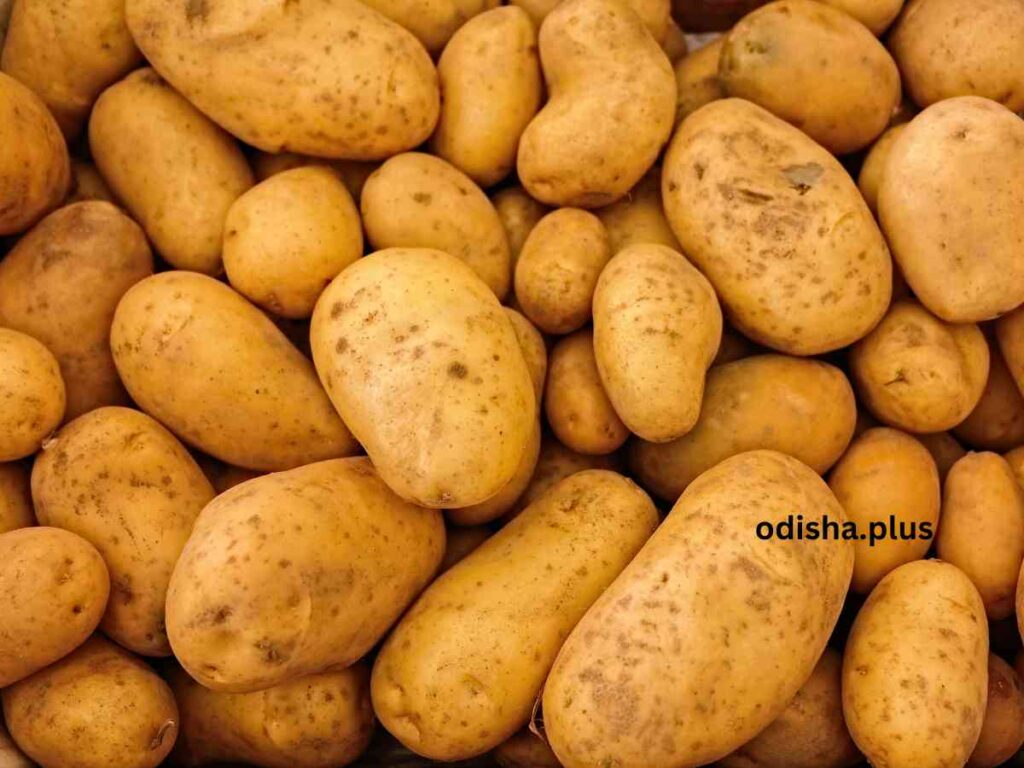Amid ongoing disputes with West Bengal over potato supplies, Odisha is now turning to Uttar Pradesh for its tuber needs, with plans to ramp up imports to alleviate shortages and high costs
Bhaskar Parichha

Despite Chief Minister Mohan Charan Majhi’s conversation with Mamata Banerjee, West Bengal persists in refusing to supply potatoes to Odisha. As a result, the state government has now made plans to source the tuber from Uttar Pradesh. This decision was reached during a meeting held on Thursday between officials from the Food Supplies and Consumer Welfare department and the Odisha Byabasayi Mahasangha.
The Minister of Food Supplies and Consumer Welfare, Krushna Chandra Patra, announced that shipments of potatoes from Uttar Pradesh have commenced. “We have received 10 to 12 trucks of potatoes from UP. Our plan is to gradually increase the imports to between 40 and 50 trucks, eventually reaching 100 trucks, thereby reducing our reliance on West Bengal. This decision is prompted by the ongoing difficulties faced by our potato dealers in the neighboring state. Truck drivers transporting these goods are experiencing harassment and extortion at the border. This situation persists even after Chief Minister Mohan Charan Majhi addressed the issue with Mamata Banerjee, who had agreed to facilitate a resolution,” he stated.
Due to border disruptions, the cost of tubers remains elevated in various markets throughout the state. Only a small number of trucks are entering from West Bengal via alternate routes. Sudhakar Panda, general secretary of the Odisha Byabasayi Mahasangha, stated that on Friday, nearly 50 trucks arrived in Odisha from the neighboring state, despite the need for at least 100 to 150 trucks.
West Bengal vs. Uttar Pradesh
Although Panda and representatives from the Food Supplies and Consumer Welfare department have asserted that the price of potatoes has decreased to between Rs 32 and Rs 35 per kilogram, the actual selling price in numerous districts ranges from Rs 40 to Rs 45. In the markets of the Twin City, potatoes are priced between Rs 35 and Rs 40, while in Berhampur, they are available for Rs 45, and in Sambalpur, the price ranges from Rs 45 to Rs 50. Similarly, in Baripada and Balasore, the selling price is between Rs 30 and Rs 40 per kilogram.
Panda mentioned that in the past, Odisha used to import potatoes from UP. However, as time passed, the state’s reliance on West Bengal grew due to shorter distances and reduced waste. The issue with UP was the higher wastage of potatoes caused by longer transportation distances and times. He refrained from discussing whether the transportation expenses from UP and the level of waste would impact potato prices in local markets. Panda assured that they would maintain the price within the range of Rs 30 to Rs 32 per kilogram.
The crunch began when transportation of potato from West Bengal to Odisha was disrupted by the West Bengal Government, resulting in a surge in prices in the Odisha market. This increase in prices had a significant impact, as potatoes are a staple food in Odisha, particularly when the prices of other vegetables are soaring. Despite attempts by some traders to smuggle potato-laden trucks into Odisha by bribing the police, these efforts were not successful.
During the recent NITI Aayog meeting in New Delhi, Chief Minister Mohan Majhi engaged in talks with Mamata Banerjee, his counterpart, regarding the resolution of the potato crisis. Unfortunately, the discussion did not produce the expected outcome. Additionally, Naveen Patnaik, the former CM and Leader of Opposition, penned a letter to Ms. Banerjee, seeking her assistance in ensuring a seamless supply of potatoes to Odisha.
Bhutan Problem
In reality, the price rise is not limited to Odisha. Potato prices in Bengal, too, have skyrocketed due to a recent strike by potato traders. Despite the strike, the retail market has not seen a decrease in potato prices. Allegedly, retailers are taking advantage of the situation by not lowering the prices. This issue is primarily attributed to the lack of monitoring by the task force. Potatoes are still being sold at Rs. 35 to 40 per kg in the retail market.
On the other hand, the market in North Bengal has been flooded with potatoes from Bhutan, causing hardship for local potato farmers. The price of Bhutanese potatoes is 20–25 rupees per kg, leading to an increase in demand. Additionally, this year’s potato yield in the state has been negatively impacted by excessive rain. With the influx of Bhutanese Farmers and traders in the state are facing additional financial strain.
(The author is a senior journalist and columnist. Views expressed are personal.)

























